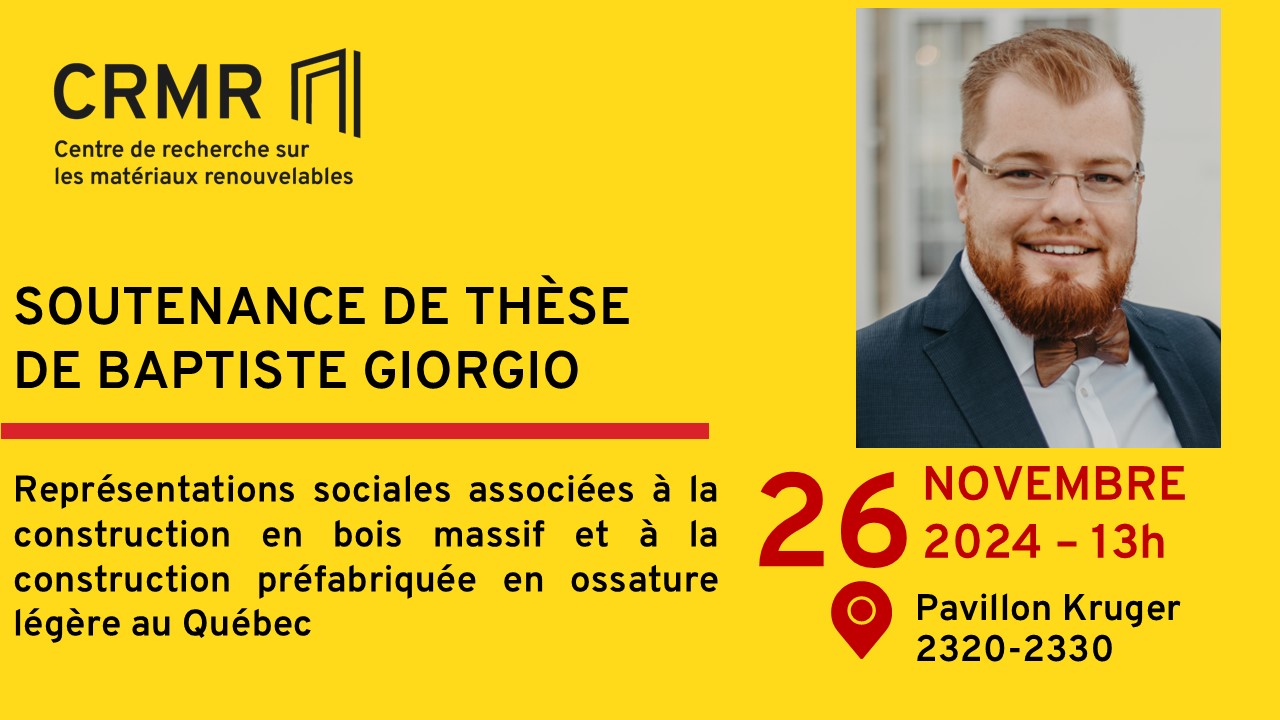Baptiste Giorgio’s thesis defense – Thursday, November 26, 1pm!
You are cordially invited to attend Baptiste Giorgio ‘s thesis defense, Ph.D. student in wood and bio-based materials engineering, which will take place on Tuesday, November 26, 2024, at 1:00 p.m. in the Gilbert-Tardif Room (GHK-2320-2330). All are welcome!
When and Where?
November 26, 2024, at 1:00 p.m.
Gene H. Kruger Pavilion
Room GHK-2320-2330 (Gilbert-Tardif Room)
2425, rue de la Terrasse
Université Laval, Québec
Zoom link for those wishing to attend online: https://lnkd.in/e2GAE6Ty
Jury Members:
- André Desrochers, Chair, Faculty of Forestry, Geography, and Geomatics, Laval University
- Annie Gosselin, non-UL examiner – Genius Group
- André Potvin, UL examiner – Faculty of Planning, Architecture, Art, and Design, Laval University
- Ivanka Lordanova, External Examiner – École de technologie supérieure
- Pierre Blanchet, Research Director- Faculty of Forestry, Geography, and Geomatics, Laval University
- Aline Barlet, Co-Research Director – École nationale supérieure d’architecture et de paysage de Bordeaux

Thesis Title: Social Representations Associated with Mass Timber and Prefabricated Light Frame Construction in Quebec
Abstract:
The construction industry faces several major challenges, such as increased demand for new buildings, lack of productivity, labor shortages, and the need to reduce environmental impact. In response, transitioning from on-site construction to factory prefabrication offers a promising solution. Despite its advantages, this construction mode currently represents only 2.5% of the construction market in Canada. On the environmental front, existing policies focus primarily on optimizing energy use during the operational phase of buildings, overlooking the reduction of inherent impacts associated with construction materials. However, these intrinsic emissions contribute to a carbon budget that no future policy will be able to mitigate. Within this context, the use of wood as a construction material for multi-story and non-residential buildings appears to be a relevant solution. Yet, the adoption of these construction methods remains slow due to a sociotechnical regime that encourages stakeholders to make choices aligned with established practices.
Within this dynamic, this thesis aimed to explore how to encourage the adoption of mass timber and prefabricated light frame construction in non-residential and multi-story buildings. To this end, the research examined the perspectives of a broad range of stakeholders—from end-users to project managers, designers, and builders—to propose actionable strategies to advance these construction methods.
First, a survey was conducted to assess the perceptions of a representative sample of Quebec’s population regarding these construction approaches. The main motivations and perceived barriers to the adoption of mass timber and prefabricated light frame construction by users were identified. Additionally, the results revealed response profiles related to the sociodemographic characteristics of respondents.
In parallel, a series of semi-structured interviews with industry professionals (including architects, engineers, general contractors, manufacturers, private developers, and public developers) helped to characterize their perceptions. Along with identifying key motivations and barriers associated with these construction methods, the interviews also revealed specific reasons behind these perceptions. Finally, the response profile analysis highlighted that certain professionals have specific interests that strongly impact the adoption potential of these construction methods, underscoring the need to address these aspects in promotional strategies.
In conclusion, this thesis offers a series of recommendations to activate potential levers to encourage the adoption of wood construction and prefabrication within Quebec’s sociotechnical and economic context.

